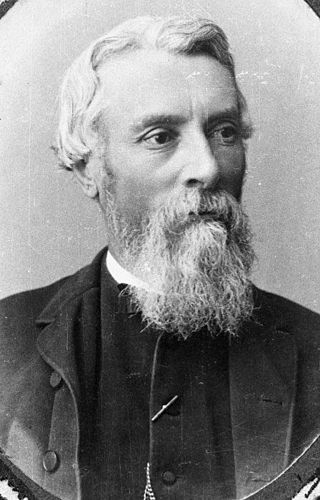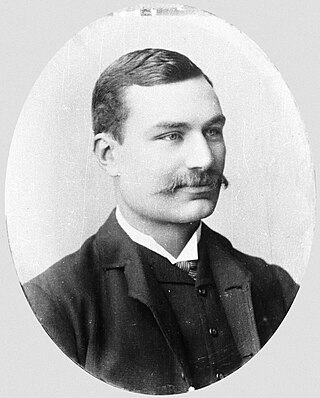Related Research Articles

William Sefton Moorhouse was a British-born New Zealand politician. He was the second Superintendent of Canterbury Province.
The 2nd New Zealand Parliament was a term of the Parliament of New Zealand. It opened on 15 April 1856, following New Zealand's 1855 election. It was dissolved on 5 November 1860 in preparation for 1860–61 election. The 2nd Parliament was the first under which New Zealand had responsible government, meaning that unlike previously, the Cabinet was chosen by Parliament rather than by the Governor-General of New Zealand.

Frederic Jones was a New Zealand politician. Originally from England, he settled in the colony in 1863 for health reasons.
Avon is a former New Zealand parliamentary electorate. It was created for the 1861 general election and existed until 1996. It was represented by 13 Members of Parliament and was held by Independents, Liberal Party or Labour Party representatives.

Arthur Edgar Gravenor Rhodes was a New Zealand Member of Parliament and Mayor of Christchurch.
Wairau was a parliamentary electorate in the Marlborough Region of New Zealand. It was one of the initial 24 New Zealand electorates and existed from 1853 until its abolition in 1938, when it was succeeded by the Marlborough electorate. The electorate had 13 representatives during its existence. The 1861 election in the Wairau electorate was notable in that a later Premier, Frederick Weld, was unexpectedly and narrowly defeated by William Henry Eyes.
Kaiapoi was a rural New Zealand electorate, north of Christchurch in the Canterbury region of New Zealand from 1861 to 1946. It was represented by twelve Members of Parliament.
Lincoln was a parliamentary electorate in the Canterbury region of New Zealand from 1881 to 1890. It was represented by two Members of Parliament.
Christchurch was a parliamentary electorate in Christchurch, New Zealand. It existed three times. Originally it was the Town of Christchurch from 1853 to 1860. From the 1860–1861 election to the 1871 election, it existed as City of Christchurch. It then existed from the 1875–1876 election until the 1881 election. The last period was from the 1890 election to the 1905 election. Since the 1946 election, a similarly named electorate called Christchurch Central has been in existence.
Ellesmere was a parliamentary electorate in the Canterbury region of New Zealand. It existed for two periods between 1861 and 1928 and was represented by six Members of Parliament.

Aaron Ayers arrived in Christchurch, New Zealand from England as a newly married man in his mid 20s. He was a hairdresser and tobacconist for two decades before entering the auctioneering business. He was elected Mayor of Christchurch in 1885 unopposed, and was re-elected a year later in the most keenly contested mayoral election thus far, narrowly beating Charles Louisson. He retired after his second term as mayor. In 1887 he contested a 1887 by-election for Heathcote and the 1887 election for Christchurch South, but came second on both occasions. After his mayoralty, he lived mostly a private life and was known as an avid gardener.

Samuel Paull Andrews was a 19th-century politician in Christchurch, New Zealand. Originally from the Isle of Wight, he was the first working class man to become a Member of Parliament in his chosen country.

John Ollivier was a Member of Parliament in New Zealand, but was better known for his membership of the Canterbury Provincial Council. He was the second chairman of the Christchurch Town Council.
The 3rd New Zealand Parliament was a term of the Parliament of New Zealand. Elections for this term were held between 12 December 1860 and 28 March 1861 in 43 electorates to elect 53 MPs. Two electorates were added to this during this term, Gold Fields District and a new Dunedin electorate created by splitting the existing City of Dunedin into Dunedin and Suburbs North and Dunedin and Suburbs South, increasing the number of MPs to 57. During the term of this Parliament, six Ministries were in power.
The 4th New Zealand Parliament was a term of the Parliament of New Zealand.
George Williamson Hall was a 19th-century Member of Parliament in Christchurch, New Zealand.
The 5th New Zealand Parliament was a term of the New Zealand Parliament. Elections for this term were held in 68 European electorates between 14 January and 23 February 1871. Elections in the four Māori electorates were held on 1 and 15 January 1871. A total of 78 MPs were elected. Parliament was prorogued in December 1875. During the term of this Parliament, six Ministries were in power.

Joseph Brittan was a New Zealand surgeon, newspaper editor, and provincial councillor, was one of the dominant figures in early Christchurch. Born into a middle-class family in southern England, he followed his younger brother Guise Brittan to Christchurch, where he and his wife arrived in February 1852 with four children. Joseph Brittan soon got involved in the usual activities of early settlers and gained prominence in doing so. He had bought 100 acres on 10 July 1851 and took up 50 of this to the east of Christchurch that he converted to farmland. There, he built the family residence, and the suburb of Linwood was subsequently named after Brittan's farm and homestead of Linwood House.

Richard James Strachan Harman was trained as a civil engineer. However, in Christchurch, New Zealand, he worked as a bureaucrat, politician and businessman. He was one of the Canterbury Pilgrims, having arrived in Lyttelton, on Sir George Seymour, one of the First Four Ships. He was a business partner of Edward Cephas John Stevens and senior partner of Harman and Stevens, and together they took financial control of the Christchurch newspaper The Press from its original proprietor, James FitzGerald, over a protracted period. Harman held many important roles with the Canterbury Provincial Council and was the last Deputy-Superintendent.

The 21 June 1875 Wairau by-election was a by-election held in the Wairau electorate in the Marlborough Province during the 5th New Zealand Parliament. The by-election was caused by the resignation of incumbent MP Arthur Seymour and was won by Joseph Ward, who defeated William Sefton Moorhouse. Ward was a well-known politician in Marlborough. Moorhouse had political seniority over Ward and was at the time Mayor of Wellington, but had no personal connection to Marlborough.
References
- 1 2 3 4 Wilson, James Oakley (1985) [First ed. published 1913]. New Zealand Parliamentary Record, 1840–1984 (4th ed.). Wellington: V.R. Ward, Govt. Printer. OCLC 154283103.
- 1 2 "Heathcote election". The Press . Vol. IX, no. 1034. 2 March 1866. p. 2. Retrieved 22 December 2020.
- ↑ "Heathcote Election". The Star . No. 1381. 31 July 1872. p. Page 2. Retrieved 3 March 2010.
- ↑ "RESULT OF THE POLLING". The Star . No. 5847. 9 February 1887. p. 3. Retrieved 24 April 2010.
- ↑ "Heathcote". The Star . No. 7029. 6 December 1890. p. 4. Retrieved 24 June 2012.
- ↑ Rice, Geoffrey W. "Rhodes, Robert Heaton". Dictionary of New Zealand Biography . Ministry for Culture and Heritage . Retrieved 25 June 2012.
- ↑ "Mr. Wakefield's attempt to get returned to the general assembly for a Canterbury constituency". Vol. XVI, no. 1500. Wellington Independent. 26 February 1861. p. 4. Retrieved 27 March 2010.
- ↑ "GENERAL ASSEMBLY". Vol. XVII, no. 1740. Wellington Independent. 5 July 1862. Retrieved 27 April 2010.
- ↑ "Mr. Alfred Cox". The Cyclopedia of New Zealand. Christchurch: The Cyclopedia Company Limited. 1903. Retrieved 27 April 2010.
- ↑ "The Elections". Vol. X, no. 1250. Manawatu Times. 23 July 1884. p. 2. Retrieved 26 April 2010.
- ↑ "The Heathcote Seat". The Evening Post . Vol. XXXII, no. 185. 21 December 1886. p. 2. Retrieved 24 April 2010.
- ↑ "The General Election, 1890". National Library. 1891. Retrieved 25 February 2012.
- ↑ "Election". South Canterbury Times. 9 February 1887.
- ↑ "Meetings, Amusements". Lyttelton Times. 8 February 1887.